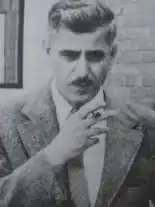Abdul Jabbar Abdullah
Abdul Jabbar Abdullah (Arabic: عبد الجبار عبد الله) (1911 – July 9, 1969) was an Iraqi wave theory physicist, dynamical meteorologist, and President Emeritus of Baghdad University.[1] Abdullah earned his Sc.D. degree in meteorology from the Massachusetts Institute of Technology in 1946,[2][3] before being appointed head of the Iraqi Teacher Association, and then chairman of the Department of Physics, College of Education, Baghdad. In 1952, he became a visiting research professor in meteorology at New York University, and in 1965 he joined the National Center for Atmospheric Research as a scientific visitor.
Abdul Jabbar Abdullah | |
|---|---|
 Abdul Jabbar Abdullah | |
| Born | 1911 |
| Died | July 9, 1969 (aged 57–58) Albany, USA |
| Nationality | Iraq |
| Alma mater | Massachusetts Institute of Technology |
| Known for | Cloud stratification |
| Scientific career | |
| Fields | Wave theory, Meteorology |
| Institutions | University of Baghdad Massachusetts Institute of Technology New York University National Center for Atmospheric Research |
In his memoir,[4] nuclear physicist Khidir Hamza claims Abdullah not only taught him, but was also instrumental in getting the former into MIT to pursue a master's degree in nuclear engineering after Hamza's initial rejection by the institute. Khidir Hamza later became part of Iraq's nuclear research program, before defecting to the United States and testifying on the program before the Senate.
As a member of the Mandaean religious minority, and a democratic personality, Abdullah was harassed towards the end of his life and arrested after the rise of the Ba'ath party to power in 1963 (Ramadan Revolution). He was imprisoned for nearly a year but was released and later permitted to travel to the United States. There he held professorial and research posts at the University of Colorado Boulder in Boulder, and the State University of New York in Albany. He died on July 9, 1969.
Biography
Abdul Jabbar Abdullah was born to a Mandaean family in the town of Qal'at Saleh, Qal'at Saleh District, Maysan Province (formerly Al-Amaarah) in southeastern Iraq in 1911.[5] Upon finishing his secondary school education in Baghdad, he left for Lebanon to pursue university education. There he enrolled at The American University of Beirut (AUB) where he majored in Physics and graduated with a BS in 1934. Later, after AUB, he did his post graduate studies at The Massachusetts Institute of Technology (MIT) where he earned his PhD.
Back in Iraq, Abdullah joined the Physics faculty at The Higher Normal College (later one of the constituent colleges of University of Baghdad), between 1949 and 1958 and became Chairman of the Physics Department.
In 1958, Abdullah was appointed secretary General of the newly constituted University of Baghdad, and in 1959 he became the University's President; remaining in this post until the February, right-wing ultra nationalist, coup d'etat which he was forced to resigned, and badly treated for political reasons.
Research
Abdullah's research interests included cloud stratification,[6] solitary waves,[7] and pressure pumps.[8]
Bibliography
Abdullah has published multiple books on atmospheric sciences, and was the editor and publisher of Iraq's sole science journal in the 1950s: "Proceedings of the Iraqi Scientific Society".
Books
- Abdul Jabbar Abdullah, James J. O'Brien, National Center for Atmospheric Research (U.S.). Internal Gravity Waves of Finite Amplitude in a Stratified Incompressible Atmosphere: -- a Quasi-characteristic Method. National Center for Atmospheric Research.
- Abdul Jabbar Abdullah. On the Dynamics of Hurricanes. New York University, 1953.
- Abdul Jabbar Abdullah. Group-velocity of Atmospheric Waves. Massachusetts Institute of Technology, 1946.
Death
Abdullah died at the Albany Medical Center on July 9, 1969 after long illness.[9]
Legacy
Abdul Jabbar Abdullah is highly regarded by Iraqis, who commemorated his 100th birthday in Iraq and in the diaspora. A hall in the University of Baghdad is named after him as well as numerous streets.
References
- National Center for Atmospheric Research. "Repository" (PDF). Archived from the original (PDF) on 11 December 2013. Retrieved 18 June 2013.
- MIT. "MIT 1961 centennial program" (PDF). MIT. Archived from the original (PDF) on 5 March 2016. Retrieved 18 June 2013.
- MIT Museum Collections. "MIT Museum Collections". MIT. Retrieved 18 June 2013.
- Hamza, Khidhir; Jeff Stein (2001). Saddam's Bombmaker: The Terrifiying Inside Story of the Iraqi Nuclear and Biological Weapons. Simon and Schuster.
- "Birth Certificate" (PDF). Retrieved 12 December 2017.
- Abdullah, Abdul Jabbar (1967). "STRATIFICATION OF CLOUD LAYERS IN A STABLE ATMOSPHERE" (PDF). Monthly Weather Review. 95 (4): 189–197. Bibcode:1967MWRv...95..189A. CiteSeerX 10.1.1.395.3634. doi:10.1175/1520-0493(1967)095<0189:soclia>2.3.co;2.
- Abdullah, Abdul Jabbar (1956). "A NOTE ON THE ATMOSPHERIC SOLITARY WAVE". Journal of Meteorology. 13 (4): 381–387. Bibcode:1956JAtS...13..381A. doi:10.1175/1520-0469(1956)013<0381:ANOTAS>2.0.CO;2.
- Abdul Jabbar, Abdullah (1953). "Head-on collision between two pressure jumps". Journal of Geophysical Research. 71 (8): 1953–1962. Bibcode:1966JGR....71.1953J. doi:10.1029/JZ071i008p01953.
- "Dr. Abdul Abdullah, Meteorologist, 57" (PDF). The New York Times. 12 July 1969. Retrieved 12 December 2017.